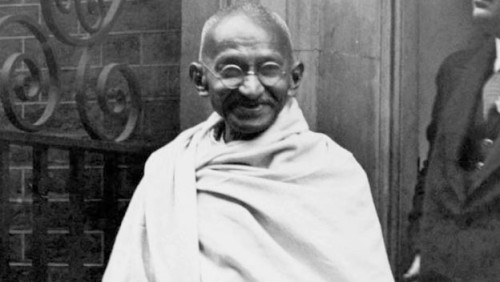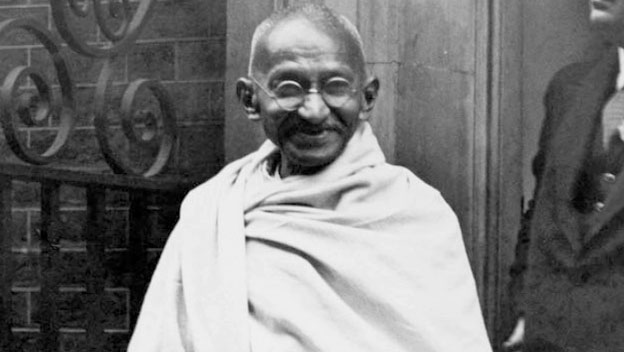
“A man is but the product of his thoughts. What he thinks, he becomes.”
– Gandhi
2
“I regard myself as a soldier, though a soldier of peace.”
– Gandhi
3
In a small city in Western India, Mohandas Gandhi was born. The year was 1869. Gandhi’s mother was a very religious woman whose belief in Hinduism was incredibly strong. His father was prime minister, meaning he worked in government.
4


Gandhi was a shy but rebellious teenager. At the young age of 13, Gandhi and his wife Kasturba were wed in an arranged marriage, an Indian custom of the time.
7
In the late 1880s, Gandhi traveled to London to study law despite elders* from his caste telling him that he should not go.
* elders – older people
8

Gandhi returned to India after he graduated from law school, but he lost his first case as a lawyer. He was then sent to South Africa to work for an Indian trading company.
10


Living in South Africa opened Gandhi’s eyes to how the Indians living there were treated unfairly. One experience changed his life forever…
13
About a week into his stay, Gandhi was traveling on business by train. A white man entered the 1st class rail car in which Gandhi was traveling and asked the conductor to remove Gandhi, who he called a “darker-skinned Indian.” Gandhi, with his ticket in his hand, refused to give up his seat.
14

Gandhi was thrown off the train at the next stop and spent a long, shivering night in the cold at the Maritzburg railway station.
16


Gandhi was no longer in South Africa just to work for an Indian trading company. After his experience on the train, he realized his role there was much bigger than that. Because of the experience, he decided he would use his legal skills to promote justice for Indians in South Africa.
19
He would not do this alone. Gandhi organized groups and letter-writing campaigns to help him in his quest.
20

He protested a £3 tax the South African government demanded of all people of Indian descent* by leading 2,221 people on a march. Though he is thrown in jail for this, the government eventually stopped the tax when his protest continues to spread.
*descent – a person’s background in terms of family/nationality
22

In 1915, Gandhi returned to India. News of his achievements in South Africa had spread to his home country, and Gandhi was willing to continue fighting the battle against injustice in India under British rule.
24

This was a period of time called the British Raj. Raj is a word in Hindi that means “rule.” The large British Empire actually ruled over India and other parts of South Asia. India was not an independent country like it is today, but Gandhi hoped to see India gain its freedom from the British in his lifetime.
26

One of Gandhi’s major beliefs was his commitment to non-violence. Instead of using violence to bring about change, Gandhi focused on non-violent and peaceful ways to accomplish his goal of an independent India with religious tolerance and acceptance of all faiths.
28


For example, Gandhi promoted boycotts. Boycott is a verb that means to refuse to buy something. Gandhi boycotted British cloth and instead spun his own cloth.
31
Another method used by Gandhi in his fight to bring an end to the British Raj is called civil disobedience. Civil disobedience is the refusal to obey unjust laws.
32

One of Gandhi’s greatest demonstrations of civil disobedience is known as the Salt March. In 1930, he organized this march to peacefully protest a series of unfair laws that Britain was enforcing in India that dealt with salt production.
34


Salt was a necessity (absolutely needed) in India’s hot climate. Indians were not allowed, by law, to produce or sell salt. Instead, Indians had to buy very expensive ($$$$) salt from the British — and only the British. For nearly a month, Gandhi and his followers peacefully marched down India’s western coast, gathering more and more followers each day.
37

Finally, when they reached the town of Dandi, Gandhi and his marchers picked up handfuls of salt by the shore and technically broke the unfair salt laws in place. At last, after months of peacefully refusing to follow the laws about salt and after thousands of Indians were thrown in jail (including Gandhi!) for their acts of civil disobedience, Gandhi negotiated a solution.
39
“With this I’m shaking the foundations of the British Empire.”
40


The Indians in jail for producing or selling salt were freed and the British changed the laws to allow Indians to produce their own salt. Gandhi’s demonstration of civil disobedience was a success.
43
Several years after the Salt March, Winston Churchill, the British Prime Minister (political leader), called on India to support Britain’s fight against Nazis in World War II. Gandhi protested this, and started a movement to “Quit India.”
44

As a result of his “Quit India” campaign, Gandhi and his wife, Kasturba were thrown in jail. Kasturba died in prison, and Gandhi was eventually released. That would be the last time in Gandhi’s life that we would be thrown in jail.
46

In 1947, after years of civil disobedience and nonviolent protest, Gandhi witnessed something he had been waiting and fighting for: India’s independence. The British Raj was over at last.
48

But Gandhi did not have everything he wanted. Gandhi worked hard to improve relations* between Hindus and Muslims. He wanted India to have these two religious groups united and traveled around promoting this idea.
*feelings, the relationship between
50

Sadly, on January 30th, 1948, a young man shot Gandhi three times in the chest, killing him. At the time, Gandhi was on his way to giving an evening prayer. Though his life was cut short, Gandhi went on to inspire others with his story and his achievements.
52

Gandhi was given the name “Mahatma,” meaning great soul.
“In the midst of death, life persists*. In the midst of untruth, truth persists. In the midst of darkness, light persists.”
An estimated 1 million people attended his funeral to say one final goodbye
persists – to continue, to go on
54

Though his time on Earth was cut short, Gandhi’s legacy continues. Gandhi is considered the “Father of India” for his role in India’s Independence movement, but his reach goes far beyond his home country. Many other leaders, including Barack Obama, Nelson Mandela, Albert Einstein, and Martin Luther King Jr., have been inspired by Gandhi and his teachings.
56

In a gentle way, you can shake the world.
58
Published: Feb 10, 2016
Latest Revision: Feb 28, 2019
Ourboox Unique Identifier: OB-106098
Copyright © 2016








